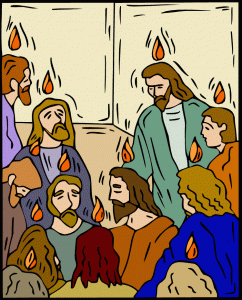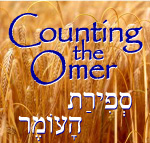Shavuot is the third of the seven festivals (after Passover and the Feast of Unleavened Bread) of YHVH and occurs in the late spring of the year.
Passover pictures coming out of one’s spiritual Egypt or the world, putting faith in Yeshua the Messiah, and hav ing one’s sins covered by the blood of Yeshua the Lamb of Elohim. As one comes out of the world and turns one’s life over to lordship of Yeshua, one turns from a life of sin and turns to loving and obeying the commands of Yeshua (John 14:15). In other words, one must leave one’s sin (as pictured by leavening in bread) in Egypt, and live a new sin-free life under Yeshua. The Feast of Unleavened Bread pictures this process of de-leavening one’s life of sin, and “eating” the unleavened bread of YHVH’s Word.
ing one’s sins covered by the blood of Yeshua the Lamb of Elohim. As one comes out of the world and turns one’s life over to lordship of Yeshua, one turns from a life of sin and turns to loving and obeying the commands of Yeshua (John 14:15). In other words, one must leave one’s sin (as pictured by leavening in bread) in Egypt, and live a new sin-free life under Yeshua. The Feast of Unleavened Bread pictures this process of de-leavening one’s life of sin, and “eating” the unleavened bread of YHVH’s Word.
However, humans are not able to remove sin from their own lives by their own efforts anymore than one can pull oneself up by the bootstraps. Sin is too much a part of our mind, will and emotions that we need the working and enabling power of YHVH’s Set-Apart Spirit (Ruach HaKodesh) in our lives to bring sin to light and to empower us to overcome it. This happens as we begin to feed upon the Word of YHVH-Yeshua (the Bible) and little-by-little our lives come into conformity with that Word and with the life of Yeshua. He is the Word of YHVH made flesh (John 1:14; Rom 8:29). This is pictured by the children of Israel receiving the words and instructions on how to live a set-apart and sanctified life (contained in the Torah-law) of YHVH Elohim at Mount Sinai during the Feast of Weeks. This was repeated during the apostolic era on the Day of Pentecost as Yeshua promised to send the Comforter to live inside of redeemed believers aiding them at arriving at the truth of YHVH (John 14:16, 26; 15:26; 16:7, 13). This promise was fulfilled on the Day of Pentecost (Acts 2).
In the Bible, Shavuot is also known as the Feast of the Harvest of the First Fruits (Exod 23:16), Day of First Fruits (Num 28:26) and the Feast of Weeks or Shavuot (which is Hebrew for weeks, Exod 34:22; Deut 16:10, 16; 2 Chr 8:13). Shavuot falls fifty days “from the day after the [weekly] Sabbath” (NKJV) that falls during the Days of Unleavened Bread, and hence the derivation of the name Pentecost (meaning “to count fifty”) as recorded in the Testimony of Yeshua (or New Testament/NT, Acts 2:16).
YHVH through his Torah (the law of Moses) instructed his people that Shavuot was…
- a day of rest where laborious or servile work was prohibited (Lev 23:21)
- a commanded assembly (Lev 23:21)
- a time when the priests offered up offerings and sacrifices (Lev 23:18–20)
- a time when all males were to bring the tithes of the increase of their income (Exod 23:14; Deut 16:16)
- a time when the priests were to offer up as a wave offering to YHVH two loaves of leavened bread made of the freshly harvested wheat (Lev. 23:17–20)
- to occur where YHVH would place his name and all were to go there to celebrate it (Deut 16:11)
- a time of rejoicing (Deut 16:11)
- to be forever (Lev 23:21)
- The early first-century, Book of Acts believers celebrated Shavuot (or Pentecost) in Acts 2:1 as did Paul (Acts 20:16).
Happy Shavuot!


 n” and these days all point to the various steps along the path of salvation that redeemed believers find themselves on.
n” and these days all point to the various steps along the path of salvation that redeemed believers find themselves on.


